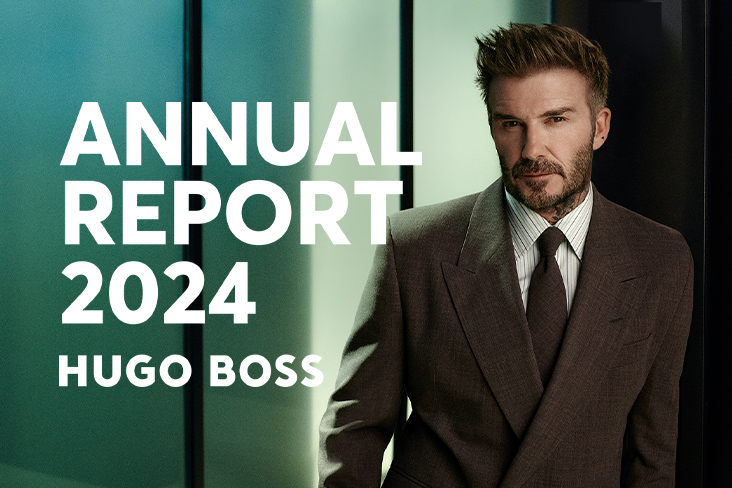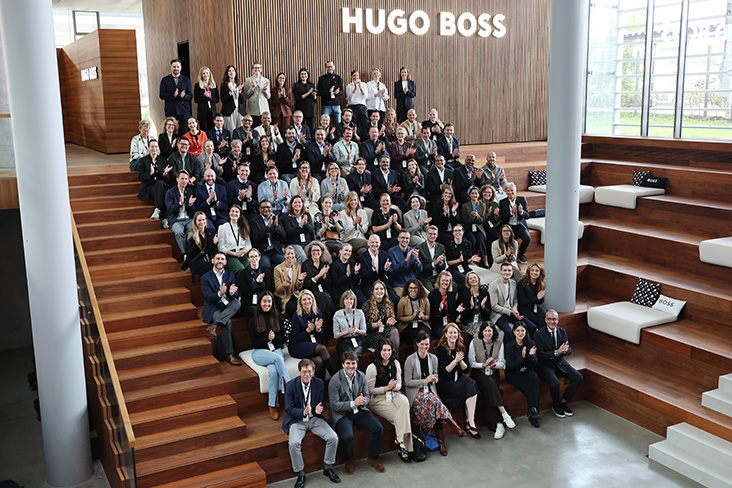Human Rights & Working Conditions
HUMAN RIGHTS HAVE TOP PRIORITY
We take responsibility not only for our own products but also for the people who develop, produce and sell them. We are therefore committed to respecting human rights along our entire value chain and expect the same from our employees, business partners and third parties directly or indirectly related to HUGO BOSS. To meet this goal, we have established a process (due diligence process) for complying with human rights due diligence obligations, which is updated at regular intervals.
OUR FRAMEWORKS FOR RESPECTING HUMAN RIGHTS
Respect for human rights along our entire value chain is fundamental to us – as explained in the Human Rights Statement by the HUGO BOSS Managing Board. This position is applied throughout our organization through the HUGO BOSS Code of Conduct, the HUGO BOSS Supplier Code of Conduct and the HUGO BOSS Human Rights Policy. In this way, our own employees and those of our partners around the world are covered by the rules, which are based on international standards.
Collaboration with our suppliers


-
RISK ANALYSIS OF HUMAN RIGHTS IMPACTS
We are aware that our international sourcing activities are connected to potential and actual negative impacts on human rights. Human rights-related risks such as working hours or occupational health and safety are therefore fundamental components of the company's management of risks, in which a defined process (due diligence process) is applied. This involves analyzing and classifying risks and determining specific measures according to their type and evaluation. External stakeholders are also involved in order to prioritize the risk areas and risk groups. We carry out risk assessments for the entire value chain – from the production of raw materials to the manufacture of fabrics and apparel, including administration and transportation, through to the sale of the products to the customer, as well as when entering into new business relations such as mergers & acquisitions or joint ventures. In our human rights due diligence process, we focus on materiality, severity of violations, and the possibilities for compensation. It also considers those known as "vulnerable groups", which are generally at increased risk of potential human rights violations. These include children, young workers, women, migrant workers, indigenous peoples, and homeworkers.
As we bear a particularly large responsibility for our own employees, who have a direct influence on how we deal with human rights issues, we also consider them as a separate group in our risk analysis. Furthermore, our NPM (Non-Production-Materials) suppliers and own production facilities are taken into account in the due diligence process.
-
DUE DILIGENCE PROCEDURE
Our due diligence process includes the industry risks, the country risk, and the individual risk of the respective partners’ operations. If the country risk level is too high, the country would be excluded as a procurement market in advance. The industry and country risks are assessed automatically and integrated into the overall risk analysis. To calculate the individual risk, every supply chain partner must fill out a Self-Assessment on an annual basis and be available for in-person audits that include interviews with workers. The individual risk monitoring procedures include all important human rights and environment-related aspects. The information obtained about a specific supply chain partner is summarized, and an overall risk level for that supply chain partner is determined. The supply chain partner then receives Corrective Action Plans (CAPs), and is asked to work on them to minimize the identified risks and improve their performance.
The supplier then provides proof of the risk reduction measures from the specific CAPs, which are checked with the help of a four-eyes principle. In a final step, the risk level is reduced. If a supplier does not successfully improve human rights risks within a predefined timeframe and provide evidence of this, an escalation process is initiated which could lead to the termination of the business relationship (Responsible exit).
-
RESULTS OF THE CONTINUOUS RISK ANALYSIS
Our continuous analysis shows that there is an increased risk of potential human rights violations on the level of our Tier 1 and Tier 2 suppliers. The results of this analysis are also in line with the results of our materiality analysis. In this context, relevant risk areas such as child and forced labor (including modern slavery and human trafficking), working hours, occupational health and safety, freedom of association and collective bargaining, fair remuneration, and discrimination are assessed. In general, HUGO BOSS assumes a permanently significant risk in the areas of child labor, forced labor, working hours and remuneration due to generally known industrial risks. Accordingly, these risks are permanently prioritized as part of the analysis - regardless of the annual results. In addition, vulnerable groups were identified.
-
PREVENTIVE AND REMEDIAL ACTION
The results of the due diligence process show us where we need to take action to minimize human rights risks. In doing so, we pursue an approach that aims to reduce the likelihood of human rights violations occurring in the first place. To this end, we have introduced targeted measures for our supply chain that prevent negative impacts on human rights or, in the event of a negative impact occurring, guide our partners to adjust the situation accordingly. For example, supply chain partners participate in an online social compliance training in order to comply with certain social standards that we have defined in our HUGO BOSS Supplier Code of Conduct. Their compliance is monitored at regular intervals. In addition, we provide our supply chain partners with guidelines for particularly sensitive issues, for example, the HUGO BOSS Child Labor and Forced Labor Policy and train our suppliers through an e-learning platform. To holistically prevent risks in the long term, we engage in external multi-stakeholder improvement projects. Extensive information on our management of preventive and remedial actions in the supply chain, such as social audits, trainings and engagement on key issues, can be found here.
Transparent grievance mechanism
If, in individual cases, our preventive measures are not sufficient to prevent negative human rights or environmental consequences, we give those affected the opportunity to report them. Employees of HUGO BOSS, its partners and suppliers, as well as customers of the company and other third parties, have the opportunity to report potential or existing human rights or environmental damage in connection with the business activities, products, or services of HUGO BOSS.
HUGO BOSS guarantees the greatest possible protection for whistleblowers, affected persons, and employees who are involved in the investigation of reported misconduct. Concerns are treated confidentially, while reports and communication can be anonymous.
In order to overcome barriers to access, various channels to file complaints may be necessary. For this reason, HUGO BOSS offers several different whistleblowing channels to provide access for everyone.
Our grievance channels
Speak Up Channel
The HUGO BOSS Speak Up Channel offers confidential and anonymous communication with the HUGO BOSS Compliance Department. The channel is available in over 50 languages and can be accessed via the following QR code:

Ombudsperson
The HUGO BOSS Ombudsperson is an external lawyer who can be contacted confidentially and anonymously – in person or via a form.
Dr. Carsten Thiel von Herff, LL.M. External Attorney-at-Law
Phone: +49 521 55 7 333 0
Mobile: +49 151 58 23 03 21
E-Mail: ombudsmann@thielvonherff.com
Thiel von Herff Rechtsanwälte
Loebellstraße 4
33602 Bielefeld
Germany
The form is available in many languages.

-
INTERNATIONAL TELEPHONE NUMBERS
The HUGO BOSS Ombudsperson can be contacted at any time free of charge via the international numbers listed below. Any language barriers are overcome by the use of professional interpreters if necessary.
- Austria: 00800 66 28 37 626 / 00800 OMBUDSMAN
- Belgium: 00800 66 28 37 626 / 00800 OMBUDSMAN
- Bosnia and Herzegovina: 00800 66 28 37 626 / 00800 OMBUDSMAN
- Brazil: 00800 66 28 37 626 / 00800 OMBUDSMAN
- Bulgaria: 00800 66 28 37 626 / 00800 OMBUDSMAN
- China: 00800 66 28 37 626 / OMBUDSMAN
- Croatia: 00800 66 28 37 626 / 00800 OMBUDSMAN
- Denmark: 00800 66 28 37 626 / 00800 OMBUDSMAN
- Egypt: 00800 00 09 571
- France: 00800 66 28 37 626 / 00800 OMBUDSMAN
- Germany: 00800 66 28 37 626 / 00800 OMBUDSMAN
- Greece: 00800 66 28 37 626 / 00800 OMBUDSMAN
- Hong Kong: 00800 66 28 37 626 / OMBUDSMAN
- Hungary: 00800 66 28 37 626 / 00800 OMBUDSMAN
- India: 00800 66 28 37 626 / 00800 OMBUDSMAN
- Indonesia: 001 803 49 32 86
- Ireland: 00800 66 28 37 626 / 00800 OMBUDSMAN
- Italy: 00800 66 28 37 626 / 00800 OMBUDSMAN
- Malaysia: 00800 66 28 37 626 / 00800 OMBUDSMAN
- Macedonia: 00800 66 28 37 626 / 00800 OMBUDSMAN
- Mexico: 00800 66 28 37 626 / 00800 OMBUDSMAN
- Netherlands: 00800 66 28 37 626 / 00800 OMBUDSMAN
- Poland: 00800 66 28 37 626 / 00800 OMBUDSMAN
- Portugal: 00800 66 28 37 626 / 00800 OMBUDSMAN
- Romania: 00800 66 28 37 626 / 00800 OMBUDSMAN
- Serbia: 0800 19 10 46
- South Korea: 00800 66 28 37 626 / 00800 OMBUDSMAN
- Spain: 00800 66 28 37 626 / 00800 OMBUDSMAN
- Switzerland: 00800 66 28 37 626 / 00800 OMBUDSMAN
- Taiwan (SAR China): 00800 66 28 37 626 / 00800 OMBUDSMAN
- Thailand: 00800 66 28 37 626 / 00800 OMBUDSMAN
- Turkey: 00800 66 28 37 626 / 00800 OMBUDSMAN
- Ukraine: 00800 50 47 10
- UK: 00800 66 28 37 626 / 00800 OMBUDSMAN
- USA: 00800 66 28 37 626 / 00800 OMBUDSMAN
There is currently no toll-free telephone number available for the following countries:
- Bangladesh: 0049 151 58 230 321
- Laos: 0049 151 58 230 321
- Sri Lanka: 0049 151 58 230 321
- Vietnam: 0049 151 58 230 321
The form is available in many languages. View the form
-
Further contact persons
Our own employees also have the option of directly contacting the central compliance department, the local compliance officers, the works council (for employees of HUGO BOSS AG), or a whistleblower hotline (in the USA).
Workers in the supply chain are also free to use other options, such as filing a complaint about the FLA. HUGO BOSS also participates in the “Occupational Safety and Health Complaints Mechanism” of the RSC/RMG Sustainability Council. This offers all employees and their representatives the opportunity to use the independent complaints mechanism to report complaints about health and safety problems to the RSC anonymously.
We also monitor incident reports beyond our own channels, for example via the Textiles Partnership Incident List, in order to identify risks in the supply chain. If information thereby becomes known about incidents at the company's own production facilities or at those commissioned by HUGO BOSS, the company contacts their management to ensure that appropriate measures are taken.
If a potential violation is identified in the course of a complaint, the extent to which risk management should be adjusted in light of the knowledge gained is evaluated. In case of doubt, this leads to an event-related risk analysis.
In general, every complainant is free to assert his or her own rights against state authorities.
-
Commitment of suppliers
HUGO BOSS obliges its suppliers to set up their own procedure for employees to report complaints or ask questions, as part of the signing of the Supplier Code of Conduct. In addition, the company expects its suppliers to exclude retaliation against workers and other stakeholders (including those they represent).
-
Reporting
It is important to us to report continuously and transparently on our activities and goals. To do this, we use various platforms, such as our annual sustainability report. In regards to employees and partners extensive information on the number of complaints received and the measures taken is provided.
-
DEALING WITH REPORTS - WHISTLEBLOWER GUIDELINES
The HUGO BOSS Whistleblower Policy summarizes all information on how to file a complaint.
-
Exchange with stakeholders
It is envisaged that the complaints channels will be reviewed once a year for their effectiveness. To this end, HUGO BOSS exchanges information with potential and existing users as well as other stakeholders about the design of the whistleblower channels, in order to take into account any feedback and suggestions for improvement.
Downloads
- Current Statements
- Guidelines and Policies on Human Rights
- HUGO BOSS Supplier Code of Conduct
- Code of Conduct
-
Onepager Supplier Code of Conduct
HUGO BOSS Supplier Code of Conduct Onepager (AL)
HUGO BOSS Supplier Code of Conduct Onepager (BA)
HUGO BOSS Supplier Code of Conduct Onepager (BD)
HUGO BOSS Supplier Code of Conduct Onepager (BG)
HUGO BOSS Supplier Code of Conduct Onepager (BIH)
HUGO BOSS Supplier Code of Conduct Onepager (BR)
HUGO BOSS Supplier Code of Conduct Onepager (CN)
HUGO BOSS Supplier Code of Conduct Onepager (DE)
HUGO BOSS Supplier Code of Conduct Onepager (EG)
HUGO BOSS Supplier Code of Conduct Onepager (ES)
HUGO BOSS Supplier Code of Conduct Onepager (FR)
HUGO BOSS Supplier Code of Conduct Onepager (GB)
HUGO BOSS Supplier Code of Conduct Onepager (HK)
HUGO BOSS Supplier Code of Conduct Onepager (HR)
HUGO BOSS Supplier Code of Conduct Onepager (ID)
HUGO BOSS Supplier Code of Conduct Onepager (IN)
HUGO BOSS Supplier Code of Conduct Onepager (IT)
HUGO BOSS Supplier Code of Conduct Onepager (JO)
HUGO BOSS Supplier Code of Conduct Onepager (KR)
HUGO BOSS Supplier Code of Conduct Onepager (LA)
HUGO BOSS Supplier Code of Conduct Onepager (LK)
HUGO BOSS Supplier Code of Conduct Onepager (LT)
HUGO BOSS Supplier Code of Conduct Onepager (MA)
HUGO BOSS Supplier Code of Conduct Onepager (MK)
HUGO BOSS Supplier Code of Conduct Onepager (MX)
HUGO BOSS Supplier Code of Conduct Onepager (PE)
HUGO BOSS Supplier Code of Conduct Onepager (PK)
HUGO BOSS Supplier Code of Conduct Onepager (PL)
HUGO BOSS Supplier Code of Conduct Onepager (PT)
HUGO BOSS Supplier Code of Conduct Onepager (RO)
HUGO BOSS Supplier Code of Conduct Onepager (SI)
HUGO BOSS Supplier Code of Conduct Onepager (TH)
HUGO BOSS Supplier Code of Conduct Onepager (TN)
HUGO BOSS Supplier Code of Conduct Onepager (TR)
HUGO BOSS Supplier Code of Conduct Onepager (UA)
HUGO BOSS Supplier Code of Conduct Onepager (UYGHUR)
- Guidelines on Child and Forced Labor



